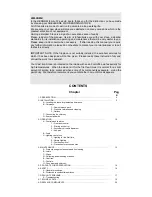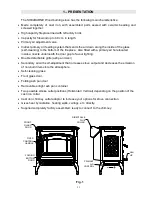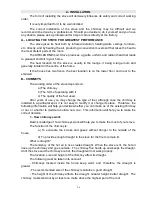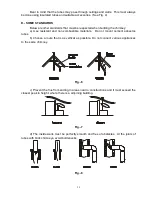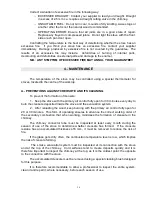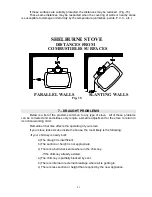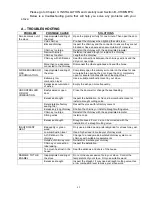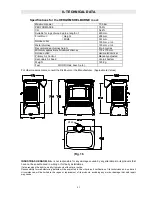
28
Male tube
Ø 150
Male tube
Ø150
Female tube
Ø175
With outlet
adaptor
Without outlet
adaptor
Fig.3
The advantages of metal chimneys are:
Easy installation.
Slight changes in chimney direction can be made, leading to greater flexibility
in the choice of location for the stove.
Due to there being curved elbow joint,
sharp edges that make draught difficult
are removed.
C.- CONNECTING THE CHIMNEY
The flue of a lounge chimney is not very
recommendable for use as a chimney flue for a stove
as it has a very large section. If you wish to use it, we
recommend you use metal tubes on the inside with the
appropriate diameter.
In this case, one of the heads (we recommend
the upper head) must be covered to prevent the
formation of draught that may cool the smoke
circulating along the metal chimney. (Fig.-2)
This model of HERGÓM stove has the smoke
outlet collar directed 45º in relation to the horizontal,
which will allow you to choose the most suitable
direction, either horizontal or vertical, by merely
turning the ca
st iron collar 180º. (Fig. 5)
To connect the chimney to the stove, lead the tube
internally according to the attached figure, adjusting it to
its conical shape and sealing the joint using refractory filler
to ensure its airtightness. Depending on your preferences,
you can also connect your stove to the chimney using the
adaptor supplied with the stove. (Fig. 3)
The joints of the remaining tubes forming the
chimney, in the event of using simple metal tubes, must be
sealed using refractory filler.
Ensure that all of the tubes in the chimney are well fitted and that their joints are fully
airtight.
When connecting the stove to the chimney, elbow joints and long horizontal sections
must be avoided as they make the draught difficult and favour the formation of creosote and
soot. Ensure that the connection is made at an upwards slant.
Fig. 2
Fig. 4
Fig.-5
CLOSE-UP OF THE PASSING OF
CHIMNEY PIPES THROUGH WALLS
AND COMBUSTIBLE STRUCTURES
HEAT
INSULATION
STRUCTURE
METAL
EDGING











